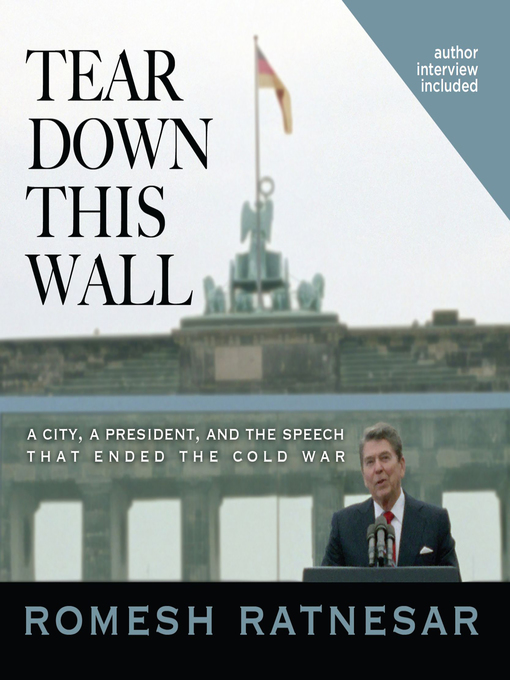Tear Down This Wall
A City, a President, and the Speech that Ended the Cold War
-
Creators
-
Publisher
-
Release date
November 5, 2009 -
Formats
-
OverDrive Listen audiobook
- ISBN: 9781608146048
- File size: 211369 KB
- Duration: 07:20:21
-
-
Languages
- English
-
Reviews
-
AudioFile Magazine
One of the climactic moments of the twentieth century, the fall of the Berlin Wall marked a period of new hope and freedom, the end of the Cold War. Reporter Romesh Ratnesar recounts details of the negotiations between the Reagan administration and the Soviet Union that led up to the reunification of Berlin. He specifically covers Reagan's famous speech at the Brandenburg Gate. The production opens with an insightful interview between narrator Wes Bleed and Ratnesar in which the author discusses his motivation for writing the book. Following this discussion is a recording of Reagan's speech and then the text itself, which Bleed narrates with vigor and alacrity. His clear, friendly voice suits the book's historical tone. Further, his reading captures the feelings of hope and determination that prevailed during this critical period in history. D.M.W. (c) AudioFile 2010, Portland, Maine -
Publisher's Weekly
August 31, 2009
Standing before Berlin's Brandenburg Gate in 1987, President Reagan delivered his famous challenge to Soviet Premier Gorbachev: to tear down the wall dividing East and West Berlin. Within two years, the wall crumbled, and the U.S.S.R. soon followed. Time
magazine deputy managing editor Ratnesar has mined American and East German archives to produce a lively, impressively detailed history of the iconic speech. Despite impeccable conservative credentials, Reagan considered avoiding nuclear war more important than defeating communism. This only became obvious in 1985, when Gorbachev assumed the Soviet leadership. Over the course of several meetings, the two leaders developed a rapport and announced disarmament agreements that distressed Reagan's hard-line supporters. In early 1987, speechwriter Peter Robinson produced a draft containing the “tear down this wall” statement, followed by a tortuous four months of innumerable drafts and quarrels with high officials who considered it unnecessarily offensive. In the end, Reagan liked the phrase, so it stayed. Being the world's sole superpower has brought America little satisfaction, so readers should enjoy this slim, lucid account of a time when events turned out brilliantly.
-
Formats
- OverDrive Listen audiobook
Languages
- English
Loading
Why is availability limited?
×Availability can change throughout the month based on the library's budget. You can still place a hold on the title, and your hold will be automatically filled as soon as the title is available again.
The Kindle Book format for this title is not supported on:
×Read-along ebook
×The OverDrive Read format of this ebook has professional narration that plays while you read in your browser. Learn more here.


